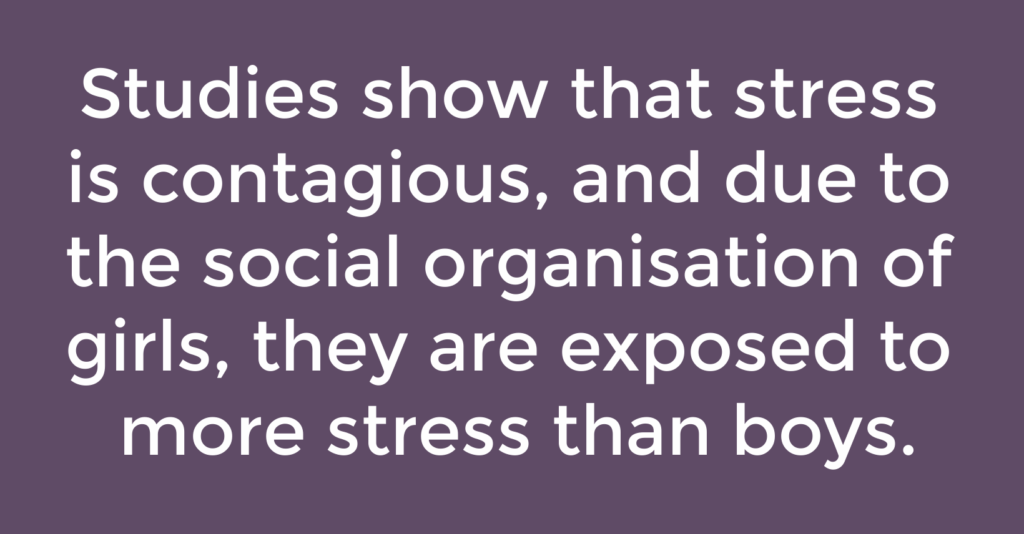Good stress vs bad stress: What’s the difference in the context of our kids learning at school?
Includes 5 top tips for parents and teachers
Recently, while driving along with one of my friends, there was a news item on the radio about the stress experienced by Year 12 students. My friend screwed up his face and said, “What’s wrong with these kids? We managed high school without all this drama. They just need to harden up.”
When I hear people make comments like this I struggle to hold my tongue. There is a chance that maybe their school experience was easy. However, it is just as likely that they have forgotten how difficult it was. After all, the brain is designed to protect us from the memory of long-term stress.
Don’t get me wrong. I don’t believe all stress is bad, nor that our kids should always be protected from it. Moderate stress actually improves our brain and if we have no stress at all our brain deteriorates. It’s all about finding that sweet spot, not too little, not too much… the Goldilock’s quota!
How does stress work?
According to educational neuroscientist, Dr Jared Cooney Horvath, it basically works like this…
Cortisol is a chemical released when we are suddenly under threat, for example, a near-miss car accident. It floods the body causing heightened awareness and a flight, fight or freeze response. As cortisol is quite toxic to the brain in large doses, our body responds by releasing ARC proteins to clean up the cortisol. Think of these proteins as millions of tiny clean up fairies.
Interestingly, the proteins don’t just clean up and fly off. They stick around and repair any damage done by the cortisol. AND….they also repair any damage that already existed. That’s right, after a short-term stress event, the brain is better than it was before. Brain fairies rule!
The problem comes when we experience long-term stress of more than a few days. Then we use up all our ARC proteins and the brain is left marinating in cortisol. It stops laying down memories as clearly as it usually does, so our memory gets worse. That’s why you can never find your keys when you are under long-term stress. Your brain didn’t effectively lay down the memory of where you put your keys!
Stress at school
According to Dr Hovarth, 80% of Australian Year 12 students report experiencing chronic stress. Many people think chronic means severe, but it doesn’t. It means sustained. That means 80% of Year 12s have been feeling stressed for a long time. Unfortunately, this means their memory is probably deteriorating, not to mention the damage being done to their physical and mental health!
There are a few main sources of chronic stress at school:
1. Assessment is structured so that there is an examination at the end of year-long chunks of the curriculum. A year is too long.
2. There is pressure for individual schools to justify their results which inevitably is then felt by staff and students.
3. Our culture sends the message that unless a child does well at school there is no hope for them in the future.
4. Students are in a closed environment with the same peers, day after day after day.
5. School is highly relationship-based and students are beginning learners when it comes to emotions and relationships.
6. Schools tend to be noisy, social places which are incongruent with the needs of introverts. In fact, that level of socialisation can be stressful for extroverts too after a while.
7. Due to their size and structure, schools tend to be heavy on rules and regulations. This can lead to a feeling of lack of control which is stressful for many.
All of these circumstances could be improved but it is unlikely to happen in the near future.
Girls suffer differently from boys
Studies show that stress is contagious, and due to the social organisation of girls, they are exposed to more stress than boys. The theory is that when a person shares stressful feelings with peers the emotional load is divided by the audience. As girls tend to have only one or two best friends whom they talk to, they carry more empathetic stress for their friends than boys. Boys tend to hang out in bigger groups and so carry a smaller proportion of their friends’ stress.
There is also a difference in the way girls and boys respond to stress. Girls are 80% more likely to talk about their stress meaning the empathetic load is even greater. Boys are 80% more likely to act on their stress.
What can we do?
In the short-term, there are things we can do to help children with chronic stress.
1. The number one factor that will bring down chronic stress is emotional safety. Getting a loving, connected hug from a parent or parent figure has a profound impact on stress levels. At school, if a child feels that they have the emotional support of their teachers and friends it will also bring stress down.
2. We can make sure our kids are exercising. Excess loads of cortisol can be expended by vigorous exercise. Being fit also helps us deal with the other physical implications of stress, like cardiovascular problems.
3. We can help children with deep abdominal breathing, otherwise known as intentional breathing or belly breathing. According to Harvard Medical School, filling the lungs slowly using belly breathing regulates our heart rate improves the oxygenation of the blood and releases tension in the body
4. Stimulate endorphins in the brain. Ensure kids are taking time out to do something they love every day. They may fight this as they feel it robs time from study, but it will help in the long run.
5. Sleep is important in decompressing stress. Ironically, stress can often rob us of sleep. Help kids develop winding down routines at the end of the day, including turning off screens at least an hour before bed.
Final thought…
Long-term stress has come to be seen as an inevitable part of 21st-century living, but it doesn’t have to be. As parents and teachers, it is our job to take the pressure down for our kids and model taking the long-term stress out of our own lives. As well as making life infinity more pleasurable, it would make us more effective thinkers.
Linda would love to meet you on her Facebook page here







